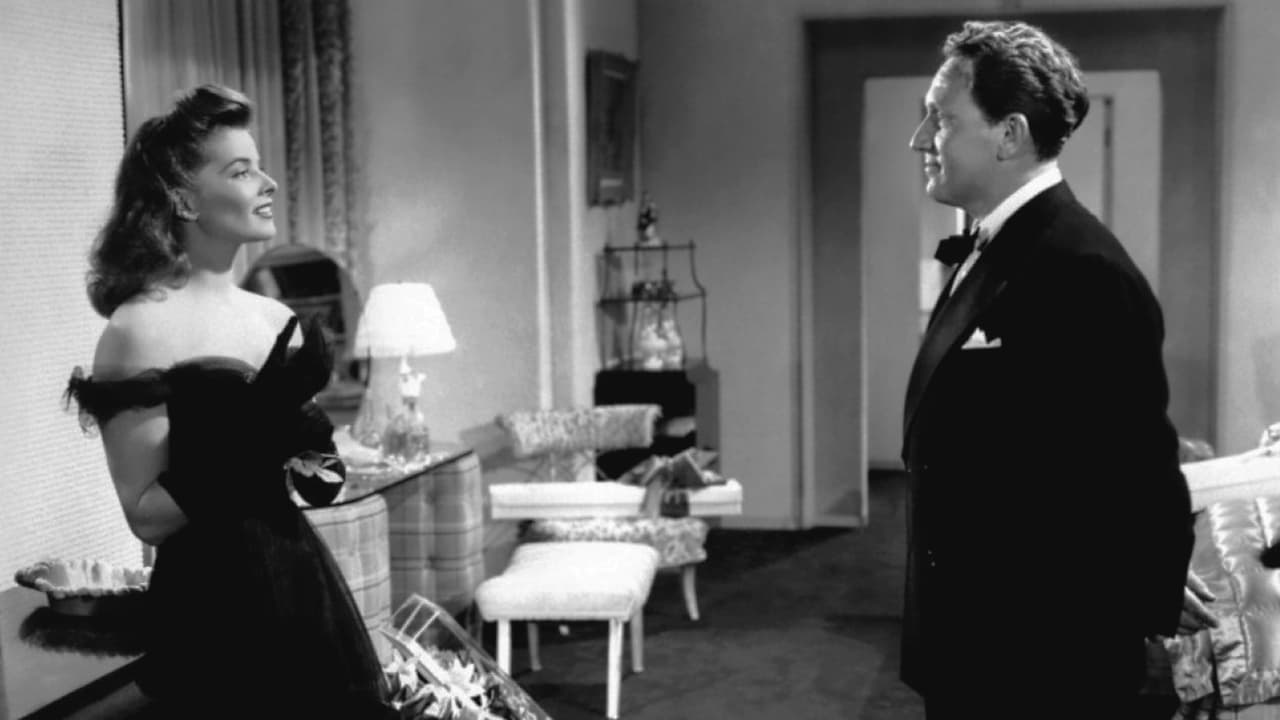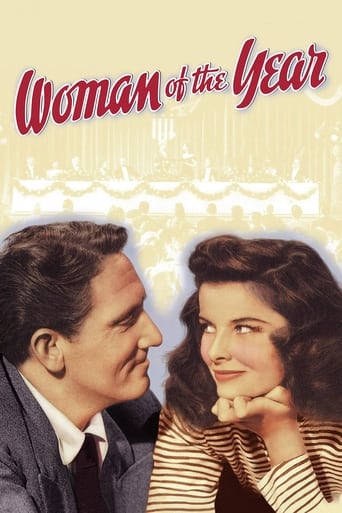

"Woman of the Year" is a blend of comedy, drama, and romance, with a rocky romance the main glue. It's the first pairing of Spencer Tracy and Katherine Hepburn of nine they would have in their careers. It was also the start of their off-screen romance and affair that would last until his death in 1967. The film is a lightly humorous story of opposites attracting one another. Tracy is a sports columnist, Sam Craig, and Hepburn is a political columnist, Tess Harding. Both work for the same newspaper, and start a small feud in their columns before the newspaper publisher, Mr. Clayton (played by Reginald Owen) calls them together to end the spat. They had never met before, but we know that romance will bloom from their first exchange of looks. Some of the earlier reviews are interesting and discuss different aspects of this film, including role reversal, feminine liberation, battle of the sexes, etc. So, I'll focus my remarks on the distinctions and some character aspects that most others have not discussed. Tess knew how to speak several languages. She had traveled the world, and lived in many cultures, being raised in a diplomatic family. She was well read, educated, informed and opinionated on foreign relations and the ways of the world. Her only shortcomings were that she had no natural attributes for caring for others or doing "the little ordinary things that any idiot can do" – in her words. But, Sam falls for her and she for him. This MGM film came out on Feb. 5, 1942. It was less than two months after the U.S. entered World War II. The screenplay and dialog have a few references to international intrigue and even war, but not much explicit. The studio heads should have had enough sense since 1939 and the outbreak of the war in Europe, to be wary of films and scripts that might be dated during wartime. This one just got by, even though audiences going to theaters would still have had Pearl Harbor and the war on their minds. Comedy had a place in relieving tensions during the war, but this film has only mild comedy. It's scenarios might induce smiles once in a while, but the film has no hilarious antics and only an occasional witty line of dialog. Apparently, an original ending went over like a lead balloon in some test screenings so MGM rewrote the last 15 minutes of the movie. The main writers were off to war or elsewhere, and Hepburn was against the revisions. I've read what the original was and it seemed quite contrived and forced. The kitchen scene toward the end is the replacement, and I think it's the funniest and only really laughable part. Here was the high achieving, intelligent, multi-lingual, well-known and famous woman of the world. For all of her education and training, having been raised with servants to do everything for her, Tess didn't even know how to boil water. She has no clue about how to make coffee. She tries to turn on a gas burner on the stove by turning on a timer buzzer. She puts bread in a toaster and then tries to get it down by shaking the toaster and pounding it on the cupboard. She separates egg whites from yolks by using a strainer and creating a mess. When Tess learns that she was chosen as International Woman of the Year, she places a call to her Aunt Ellen to tell her. Sam and their adopted five-year old boy, Chris, are there and listening. Tess says, "Ellen, the most wonderful thing that's ever happened to me has just happened." Her marriage and love weren't more wonderful? Her adopted son wasn't more wonderful? No doubt, her Woman of the Year award would bring her comfort and love for years to come.Then, going out for her award banquet she tells Sam that her maid, Alma, has already gone to the banquet. There was no one to watch and stay with little Chris and she thought he would be OK left alone for four hours or more. But, Sam knows better. He skips the banquet and stays with Chris. He later takes the boy back to the orphanage where he is happily welcomed back by some young friends. Yes, it was the Woman of the Year who would leave a five-year old child, and one recently adopted, all alone at home. I wonder if many women – mothers, homemakers, wives, single working women, and women with careers and families, didn't sense a feminine put- down by Tess in some of her remarks. For all of her education and training, Tess couldn't do the simple things that ordinary people know how to do to survive. Yet, she calls them idiots. Her comedy sequence in the kitchen at the end was a nice indictment. If idiocy exists, it must surely reach into the ranks of the privileged. The movie is based on a Broadway play. It's entertaining and enjoyable, but nothing special. Toward the end when Tess attends the wedding of her long-widower father, William (played by Minor Watson), and her aunt Ellen (Fay Bainter), the camera gives a close-up of her face for some time. Tears well up in her eyes and run down her cheeks as we hear the message of the clergyman marrying her dad and aunt. He speaks of the love and support of husband and wife for one another. I wonder if she gave any thought to the wife and children of Spencer Tracy, the man with whom she was beginning an adulterous relationship.
... View MoreWartime world war II was the struggle for the free world to keep their freedoms and aide nations whose freedoms were at risk or nations taken over to regain them. The roles of women in society had been changing slowly over the past few decades before that, so career women who dared to step up to what was normally the men's plate began to encourage other women to do the same. For popular columnist Tess Harding (Katharine Hepburn), her independence is all she knows, so so what if she can't make a pot of coffee or fry an egg? But a feud with a sports columnist is fixed with a risky solution: the best way to conquer an enemy is to marry them. Having ridiculed each other on the sly, Hepburn and Sam Craig (Spencer Tracy) begin to see each other socially, and impulsively, they get married. It's soon obvious that he is a traditionalist while she's a feminist, and obviously, neither of them want to change or compromise, and his frustration is quickly expanded. Their arguments become more aggressive after the initial amusement over their differences, and when she goes against her own ethics to try and become the traditional wife she thinks he wants, it has an even greater affect on her morale than it does on his digestion.You cannot compare gender issues of 1942 to post war year gender issues, let alone today's. Why a man would feel forced to change his ways in this era to appease his wife yet loose himself is as unacceptable now as it was then. The only difference now is that both sexes seem to be remaining single longer, while the war era created marriages on the spur of the moment that were regretted once the war was over. But Sam and Tess are career people at home together, who can discuss issues, and there's a lot of that. A ton of it, actually, and often, the intended comedy becomes intrusive drama that makes the two incompatible. Tess makes a fool out if herself in various ways, unable to make coffee or understand baseball, while Sam gets arrogant over her desire to keep her career as is. In a sense, it's very truthful, but it makes it difficult to root for either one without feeling sexist. Tracy and Hepburn are excellent in their first teaming together, and the writing often is brilliant. But you can't go into this with the idea that it's going to be a riotous comedy, because at times, it seems like it's written to create more battles between the sexes rather than try to create any type of understanding, let alone compromise.
... View MoreRival reporters Sam (Spencer Tracy) and Tess (Katharine Hepburn) fall in love and get married, only to find their relationship strained when Sam comes to resent Tess' hectic lifestyle."Woman of the Year" was the first of nine films Hepburn and Tracy made together. They met for the first time on the shoot. In the 1993 documentary Katharine Hepburn: All About Me, Hepburn herself says she was wearing high heels at the first meeting with Tracy and producer Joseph L. Mankiewicz, and said "I'm afraid I'm a bit tall for you, Mr. Tracy". Mankiewicz then responded, "Don't worry, Kate, he'll cut you down to size." It was during the filming of Woman of the Year that Hepburn and Tracy became romantically involved – a relationship that lasted until Tracy's death in 1967.Exactly what Tracy saw in Hepburn is beyond me. I have always found her acting ability overrated ,and her unusual voice and accent is quite obnoxious at times. I suspect she was right in her day and just kept on going fueled by past success. Much as the "husky voices" of Howard Hawks' women would not be popular today, but allowed some women -- notably Lauren Bacall -- to gain stardom.
... View MoreSpencer Tracy and Katherine Hepburn are at it again, but this time they are print journalist at the same newspaper. He is Sam Craig, and he has a sports column. He engages in a feud with political activist Tess Harding (Katherine Hepburn) who is outspoken and has an opinion on everything. She can speak in many different tongues because she know everybody except Hitler. Strangely enough, the down-to-earth Craig is attracted to the highly unconventional Tess who behaves like a buoy in stormy seas. She is much sought after for her views and presence. One day Sam Craig proposes to her and he discovers that she lives in a kind of Grant Central Station. People flock into and out of her life and her personal secretary Gerald Howe (Dan Tobin) is constantly consulting with her. Sam realizes that he has an obstacle course to negotiate. Tess may be married but she doesn't see Sam as the most important person in her life. More often than not she is off gallivanting around at conventions, meetings, etc., to have any time to spend with poor Sam. The straw that breaks the camel's back comes in the form of a little boy that Tess adopts without Sam's consent. Tess has an important meeting to attend and insists that Sam accompany her. Sam is in no mood to accompany Tess much less leave the little boy, Chris (George Kezas), home alone to fend for himself. Sam wants to have a child with Tess, but Tess is too busy. Finally, Sam takes little Chris back to the relief agency where Tess found him and used him as publicity stunt. The problem is that Tess isn't behaving like a mature adult. After Sam returns Chris (and Chris is overjoyed to be reunited with his pals), Sam leaves Tess. As it turns out, Tess' estranged parents, Ellen (Fay Bainter) and William (Minor Watson), are having another wedding. Sam is off at a boxing championship and refuses to budge to see Tess' parents. While she is listening to the wedding ceremony, Tess realizes how insensitive that she has been and goes back to Sam. You can guess what happens in this predictable but entertaining romantic comedy set against the backdrop of World War II. Tracy and Hepburn are perfectly suited for one another.
... View More